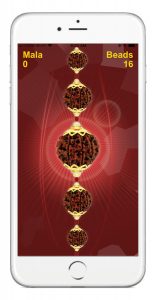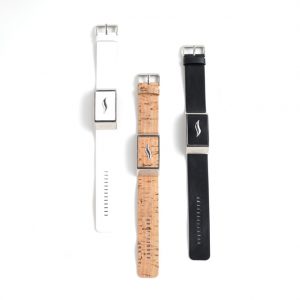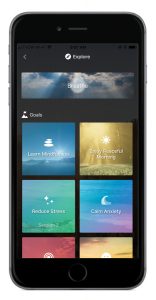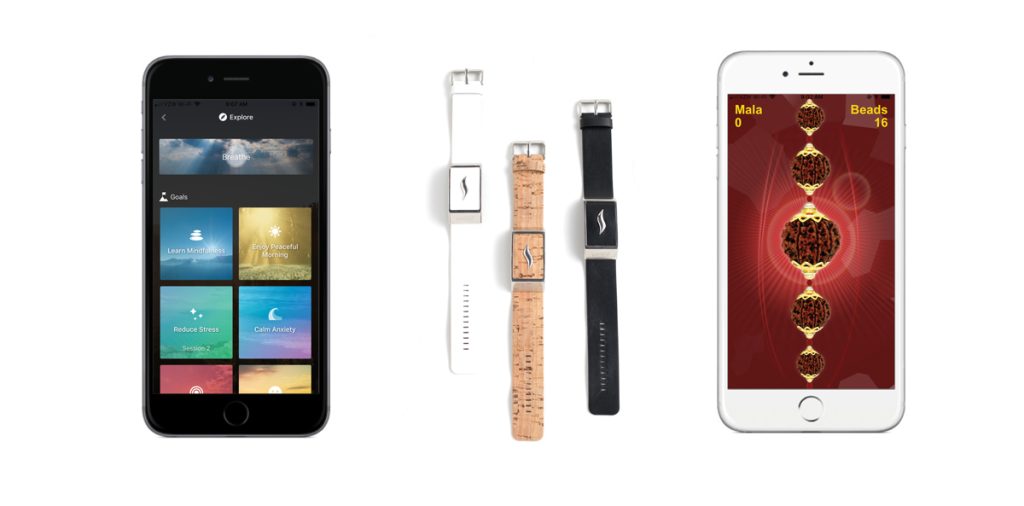Some people like to keep it simple when it comes to meditation apps; others appreciate more in the way of technological assistance. My Mala is for those in the first category. The app is an unadorned set of virtual mala beads you can use to track your breaths, mantras, or prostrations. For the tech mavens, The WellBe’s Bluetooth-connected, screen-free heart rate bracelet works in concert with a mobile app to identify your daily stress triggers, while Aura uses artificial intelligence to serve you short, personalized daily meditations, thereby reducing the choice-induced paralysis that accompanies many meditation apps.
Read our entire archive of meditation app reviews here.

MY MALA
(Free)
If you’re someone who already uses mala beads, this virtual strand may be worth trying out as a techy alternative to the real thing. The app couldn’t be simpler: A string of carved wooden beads stretches vertically across the screen, surrounded by a red halo. When you touch anywhere on the screen, your device makes a plink sound, the central bead shoots upward, and the next bead slips into the center of the frame. The app has two counters: one to tally the number of beads and another for malas (sets of 108 beads). While an essential tactile pleasure is lost in touching a screen rather than sliding beads through your fingers, My Mala’s absence of distractions and satisfying sound effects can definitely inspire a meditative focus.
Available for iOS

THE WELLBE
($1.99)
The WellBe is a digital bracelet linked to a mobile app that helps users identify, prevent, and manage chronic stress. The device monitors your heart rate every hour for five minutes and sends the information to your phone via Bluetooth (future versions will check it three times each hour, resulting in a more accurate portrait). With your permission, the app syncs with your contacts, calendar, and location, and connects your heart rate variability—that is, stress level—to the people, events, and places in your daily life. The bracelet is comfortable and attractive (it’s available in three colors), but it doesn’t display the time, which may be frustrating for some users.
The app tracks your physical and lifestyle rhythms using a unique, proprietary algorithm. You can check your current levels anytime, which requires 2.5 minutes of stillness—itself a useful, if forced, meditative pause. The app’s stress-trigger graphs are particularly insightful: a graph might show that Tuesday’s morning meeting with your boss left you more tense than usual; a week later you see that an afternoon chat with him also stressed you out. You might then conclude that he tends to make you anxious and decide on your part to prepare for future meetings with one of the in-app meditations, such as “Pre-Meeting Meditation,” or decompress afterward with, say, “Meditation on Setting Boundaries.” (The WellBe meditations are developed in partnership with the Mentors Channel, an online meditation resource, and divided into two categories: “relax”— single meditations, wordless music, guided breathing exercises, and visualizations—and “prevent,” a series of stress-reduction programs.) The app can also alert you with a pop-up when your stress level is high.
It may seem counterintuitive to check your stress levels on your smartphone, but over time I noticed patterns emerging, began anticipating stress triggers, and became better able to tune into my own physical symptoms of stress before it reached peak levels. Once a few kinks are worked out in the app’s algorithm (sometimes the app indicated I was stressed when I was not, and location services did not always work), battery life is improved, and perhaps a watch features is added, the WellBe has the potential to be a useful wearable tech device that makes users aware of their daily stressors while providing them with tools for well-being.
Available for iOS and Android
thewellbe.com

AURA
(Free for the first seven days; various pricing plans thereafter)
If you have only a few minutes a day available for mindfulness practice, you probably don’t want to spend two of them scrolling through an app to find a meditation. Does this plight sound familiar? If so, downloading Aura may be the only decision you’ll need to make.
When you open the app and click on the “I’m feeling . . .” button, a selection of five common emotions pop up. Select the one that best fits your mood, choose a three- or seven-minute meditation time, and then just sit. (Those who find that’s still too much can hit the “Just Meditate” button to bypass the emotion list, and the app will select a short meditation for them.)
Aura claims it “understands you algorithmically” through artificial intelligence: the first time you open it, a series of questions (age, self-reported stress level and optimism level, ideal meditation time, and whether or not you are interested in mindfulness practice) help the app form a personal profile, which your daily meditation selections and usage further refine. Aura promises that the same meditation will never repeat. In addition, it offers a selection of wordless relaxation music, reminders, tracking, a gratitude journal, the option to share your reflections with other users, and a simple “breathe” button that brings up a pulsing circle to guide breath practice.
If you decide you could use a bit more choice, the “Explore” tab calls up a selection of popular goals, from enjoying a peaceful morning to developing confidence. Click on a goal and the app picks a three-minute meditation for you on that theme; as it gets to know you, it will also suggest follow-ups. You can save favorite meditations to your personal library if you like, or subscribe to a channel offering a selection of teachings by one teacher on that topic. The meditations are straightforward and colloquial, so that the Aura app will become a personal meditation coach in your pocket, ready with the right words at the right time.
Available for iOS and Android
aurahealth.io/
Thank you for subscribing to Tricycle! As a nonprofit, we depend on readers like you to keep Buddhist teachings and practices widely available.
